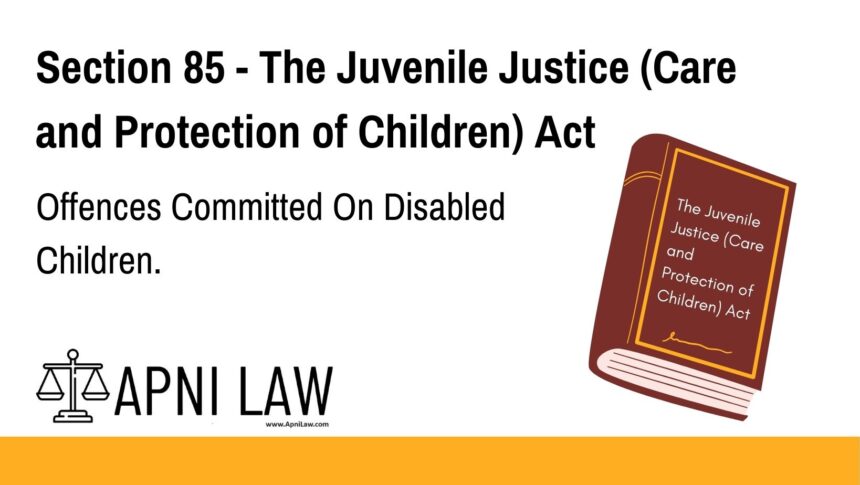Code: Section 85 – Juvenile Justice Act
“Whoever commits any of the offences referred to in this Chapter on any child who is disabled as so certified by a medical practitioner, then, such person shall be liable to twice the penalty provided for such offence.
Explanation.—For the purposes of this Act, the term ‘disability’ shall have the same meaning as assigned to it under clause (i) of section 2 of the Persons with Disabilities (Equal Opportunities, Protection of Rights and Full Participation) Act, 1995 (1 of 1996).”
Explanation of Section 85 – Juvenile Justice Act
Section 85 of the Juvenile Justice (Care and Protection of Children) Act provides for enhanced punishment when offenses are committed against disabled children. It mandates that any person committing an offense under this chapter (such as cruelty, exploitation, or abuse) against a child who is certified as disabled by a medical practitioner will face double the penalty prescribed for that offense.
This provision reflects the legislature’s intent to offer heightened protection to children with disabilities, who are often more vulnerable to abuse and neglect.
Key Takeaways:
- Double punishment for offenses against disabled children.
- Disability must be certified by a medical practitioner.
- “Disability” is defined as per Section 2(i) of the Persons with Disabilities Act, 1995.
- Applies to all offenses outlined in the relevant chapter of the Juvenile Justice Act.
Illustration
Example 1: Physical Abuse of a Disabled Child
A caregiver is found guilty of physically assaulting a 12-year-old child with cerebral palsy. Under the normal provisions, this would attract a punishment of 3 years’ imprisonment. However, because the child is disabled, Section 85 mandates that the offender will now face up to 6 years’ imprisonment.
Example 2: Sexual Exploitation of a Disabled Minor
If a person is convicted of sexually exploiting a visually impaired child under the relevant sections of the Act, they would face double the standard punishment as prescribed for such offenses.
Common Questions and Answers on Section 85
1. What qualifies a child as “disabled” under this section?
Answer: The term “disability” is defined under Section 2(i) of the Persons with Disabilities Act, 1995. It includes various physical and mental impairments such as blindness, hearing impairment, locomotor disability, intellectual disability, and others as recognized by that law.
2. Is a medical certificate mandatory to prove the child is disabled?
Answer: Yes, the child must be certified as disabled by a registered medical practitioner for the enhanced penalty provision under Section 85 to apply.
3. Does Section 85 apply to all offenses under the Juvenile Justice Act?
Answer: It applies to offenses “referred to in this Chapter” of the Act, typically involving cruelty, neglect, abuse, and exploitation of children.
4. What is the rationale behind doubling the penalty?
Answer: Children with disabilities are more susceptible to harm and often less able to protect or defend themselves. Doubling the punishment acts as a stronger deterrent and emphasizes the state’s duty to protect these vulnerable individuals.
Conclusion
Section 85 of the Juvenile Justice Act ensures stronger protection for children with disabilities by doubling the punishment for offenses committed against them. This provision upholds the principle of equality and reinforces the commitment to safeguarding the rights of the most vulnerable. Legal systems must prioritize inclusive justice, and Section 85 is a key step in that direction.
For more in-depth legal content, visit ApniLaw 🚀








